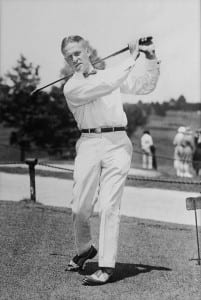Race and Amateur Golf
Bobby Jones and Tup Holmes were both very successful amateur golfers in the first half of the twentieth century. Precise comparisons between the two Atlanta natives are difficult to make for several reasons. Tup Holmes’ golf career would take off nearly a decade after Jones’ ended in 1930. At the time, there were limited resources for African American golfers to learn the game of golf, thus making Holmes’ success even more impressive. Holmes achievements raise additional questions about what he and countless other African Americans might have accomplished in golf under more favorable and equal racial conditions.
 Bobby Jones
Bobby Jones
The son of a lawyer, Bobby Jones took up golf as a child to combat health issues. He received training from the East Lake Country Club Professional Stewart Maiden. Jones attended Georgia Institute of Technology from 1918 to 1922, where he studied Mechanical Engineering and played on the golf team. Considered the most successful amateur to ever play the game, Jones played in 31 majors, winning 13 and placing among the top 10 finishers 27 times. Jones won the Grand Slam in 1930 by winning the British Amateur, the British Open, the US Open, and the US Amateur.
 Alfred Tup Holmes
Alfred Tup Holmes
Introduced to the sport of golf by his physician father, Tup Holmes honed his golf skills with the caddies at Candler Park and later at Tuskegee Institute, where he played on the golf and tennis teams and graduated with a degree in Physical Education in 1939. 1939 also marked State of Michigan and State of Ohio Amateur Championships for Holmes, and his collegiate successes included an impressive 3 Southern Intercollegiate Athletic Conference Championships. During his career, he also topped the leader board at the National Negro Amateur Championship 4 times and captured the black-only Southern Amateur title 3 times.